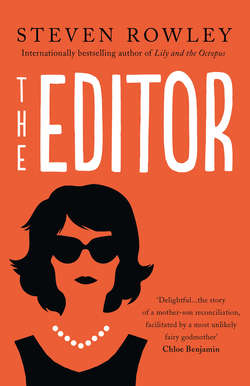Читать книгу The Editor - Steven Rowley, Steven Rowley - Страница 19
NINE
ОглавлениеWhen I land at Boston’s Logan Airport, I have only a few minutes to collect my bag and race to catch the shuttle bus to Cape Air’s small terminal for the flight to Martha’s Vineyard. The Cape Air plane is disconcertingly puny, what my father would have called a puddle-jumper. There are seats for ten passengers, five on each side of the aisle, plus a jump seat for the crew. The flight attendant places us according to weight to balance the plane; this is done discreetly as not to offend, but the end result is obvious. I’m seated across the aisle from a woman who indubitably comes from money, and I wonder if she knows Jackie, if they are neighbors on the island or on the board together of some local environmental organization to save the eroding dunes. We smile politely and say hello, but she doesn’t ask my business, which disappoints me because I’m dying to volunteer the information: I’m going to visit my editor.
Three weeks ago, Jackie sent the latest draft of my manuscript via courier marked with her edits. As mild and polite as she can be in person, taking careful consideration of my feelings as both an artist and someone younger and less experienced in the publishing world, she was just the opposite on paper. Paragraphs, sometimes pages, were crossed right out with margin notes that screamed CUT! VERGING ON MELODRAMA! TRITE! And then other parts were circled; UNDERWRITTEN! SHALLOW! GIVE THE READER MORE! My heart sank as I flipped through the pages; I had thought the latest draft addressed many of her original concerns from our earlier talks, but there were still a number of sticking points—particularly with the ending. I gave myself a week to calm down. When I reached her via phone to discuss her notes, she informed me she was working from her home on Martha’s Vineyard and invited me up to work through them.
So here I am, onboard what’s basically an enclosed hang glider, waiting for runway clearance to take flight.
The midsummer morning is warm; the sun beats off the tarmac and through the plane windows, heating the entire cabin. It feels like we are ants under a child’s magnifying glass—at any moment we might burst into flames (this is not an image you want while sitting in a fuselage). I roll up the sleeves of my linen shirt as the two outboard propellers start to spin. I look back to see if there’s an indication we might receive drink service, but signs do not point to yes. We pick up speed down the runway and take off over Boston Harbor before banking to head south toward Martha’s Vineyard and Nantucket. This is the smallest plane I’ve ever been on, and I’m amazed at how you feel every rippling current, how your stomach rises and falls with each dip and change in air pressure. I have a magazine in my messenger bag, but I don’t have any interest in even pretending to read it—the view out my window of the Massachusetts coastline is far more interesting. The ocean is an emerald green, in contrast with the sparkling aqua-blue swimming pools that dot the shore—they seem almost Caribbean by comparison. I’m finally offered a small bottle of water, which I take but don’t drink; there’s no bathroom on board and my bladder is already full.
My mother and I have spoken only once since I told her about Jackie. I called her when I cut myself shaving and the bleeding wouldn’t stop. I felt lightheaded (more from queasiness than blood loss), and without really thinking I picked up the phone; that’s how ingrained it is to always want your mother.
“I’m bleeding,” I said when she answered.
“From what?” My mother’s trademark detachment rang through.
“The ear. Not the ear. Just under the ear. The part where the earlobe connects to the jaw. I don’t know what that’s called.”
“Domino, down.” My mother’s dog yipped and then stopped, probably silenced with a treat. “I meant, what did you do.”
“Oh. I cut myself shaving.”
I could tell from her silence she wondered what it was I thought she could do from two hundred miles away.
“Anyways. I thought you could keep me company while I bleed out.”
My mother groaned. “I have a hair appointment at eleven.”
And that was the end of our conversation. No mention of the book. No questions about my life or any of the wondrous things happening. Nothing about Jackie. No real concern about my medical emergency, although my mother knew me well enough to know there was no serious call for alarm. (A therapist friend called these “bids,” my calling home with extravagant takes to get a reaction. But my mother had my number; she was maddeningly patient, never raising her paddle, passing my lot on to other, more excitable auction-goers.) This is where we are, this stalemate our new home.
I would have loved to share this trip with my mother. She would have hated this flight and in fact may have refused to board it, offended by having her weight silently gauged. But she would have loved to spy on Martha’s Vineyard, to see firsthand the places and names that she’s read about in following the Kennedys over the years: Nantucket, Hyannis Port—even Chappaquiddick. Several months with no communication is not that unusual in our relationship. It’s not the norm, but it’s not unheard of. We’ve done this before. Still, there’s a weighty sadness to our current silence; this is not merely a period of us being too busy or too lazy to speak. I have defied her expressed wishes—what else is there, really, to say? Calling to announce I had been invited to Jackie’s beach house to work on the book would only rub it in.
